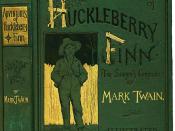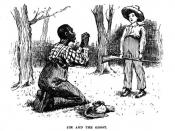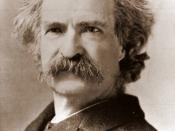4
Virk
Arash Virk
New
English 11 AP
13 December 2013
Irony is Seldom Absent
"Irony trumps everything"(Foster 122). The master brush when articulating a work of literature amidst a canvas brimming with characters, action, plot twists and cliffhangers. Thomas C. Foster describes the spectrum of possibilities for the use of irony; to not only imply a sense of comedy, but also tragedy, perplexity and even hidden significances. Mark Twain, renowned for his scholarly and playful use of humor and comedy amidst his stories articulates the idea of irony when illustrating the story of Huck Finn in his novel "The Adventures of Huckleberry Finn". Mark Twains use of characterization presented through plot situations and situational irony allows for the author to present complexities about human nature and wisdom, yet still ultimately pertain to the story.
Irony, much like in many other works of literature, cans serve to present more than just a small nuance of ideas, that pertain to the development of the plot and also the implications that can be made from them relating to modern society.
Foster asserts that irony chiefly involves "a deflection from expectation" (Foster 124) in order to describe how readers generally interpret situations to be not as they are intended. This is evident as Huck's father describes a free black man he had encountered earlier in town by saying "he was a p'fessor in collegeâ¦and knowed everything", setting up for the expectation of an accepting praiseworthy attitude, but finishes by exclaiming "he could VOTE...what is the country a-coming to?"(Twain 108). Twains characterizations of Pap serves to display the bad-mannered individual in today's society, and this ignorant stereotyping and generalizations are present throughout the novel as they serve to develop character personalities and distinguish the social era in which the novel...


